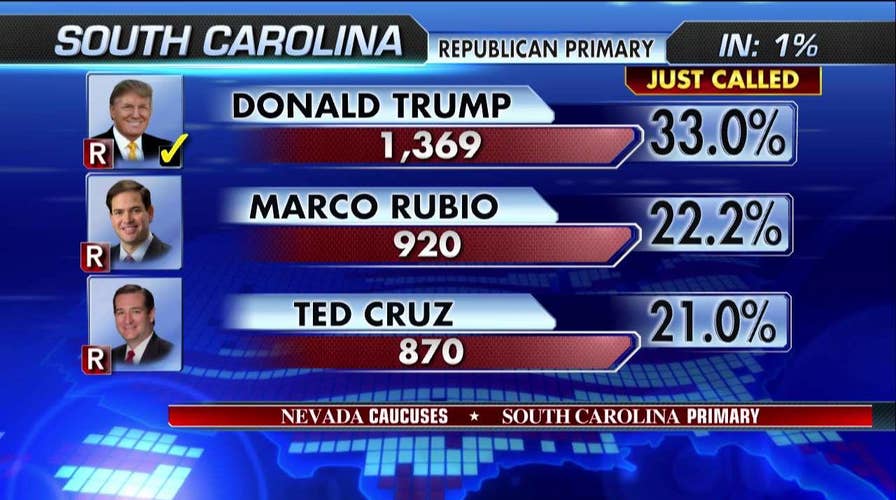Donald Trump wins South Carolina primary
Another significant victory for the Republican presidential frontrunner
Donald Trump swept to victory in the South Carolina Republican primary on Saturday, putting him in a commanding position as the race shifts to a slew of delegate-rich contests.
Jeb Bush, though, abruptly suspended his campaign after a distant finish, leaving unclear to whom his supporters will gravitate.
But Trump, at his victory rally, seemed to dismiss the notion that other candidates would benefit from Bush's exit.
"[The pundits] don't understand that as people drop out, I'm going to get a lot of those votes," Trump said.
He said the primary race lately has been "mean" and "vicious" but: "When you win, it's beautiful."
He closed by saying, "Let’s put this thing away, and let’s make America great again."
Trump's victory is not by the big double-digit margin that pre-election polls had suggested. Still, this makes back-to-back victories for Trump, who more than doubled the vote of his closest competitor in New Hampshire last week.
Texas Sen. Ted Cruz and Florida Sen. Marco Rubio remain locked in a battle for second place.
With 99 percent of precincts reporting, Rubio is narrowly leading Cruz with just over 22 percent. Trump leads with 33 percent.
Both candidates were staying confident.
"After tonight, this has become a three-person race, and we will win the nomination,” Rubio told supporters.
Rubio placed third in Iowa, but stumbled in New Hampshire following a rough debate performance. He vowed to bounce back, and entered the South Carolina contest enjoying support from the state's popular governor, Nikki Haley, and other state leaders.
Senior Cruz aides maintained the Texas senator remains “well-positioned” going into looming Southern state primaries, since he won Iowa and placed third in New Hampshire.
Lagging far behind Saturday were the three other candidates – Ohio Gov. John Kasich, retired neurosurgeon Ben Carson and Bush, all of whom appear to be stuck in single digits.
While Bush suspended his campaign, Carson vowed to stay in, as did Kasich.
The GOP race heads next to Nevada and after that to Super Tuesday, representing a delegate gold mine. Even South Carolina, with 50 delegates, is the most valuable GOP primary to date. As the winner, Trump would get the lion's share.
South Carolina, historically, also is a prized contest for Republican candidates as it has a knack for picking the eventual nominee – the primary winner has gone on to claim the nomination in every race since 1980, except for 2012 when Newt Gingrich won.
The state has a reputation as well for bringing out bare-knuckle campaign tactics, and this year was no exception. Charges of dirty politics flew on all sides in the lead-up to Saturday’s primary, with robo-calls and misleading websites surfacing about the candidates.
The race tightened in the final days, but not enough to shake Trump's long-time advantage there.
Trump had enjoyed a 13-point lead in the latest average of pre-election polls by Real Clear Politics. Fox News exit polls indicate significant numbers of late-deciding voters ended up supporting Cruz and Rubio, causing both candidates to perform more strongly than pre-election polling suggested.
Trump, according to exit polls, was still the overwhelming favorite among voters who said they’re angry with the federal government. Cruz, though, had the edge among voters who said their top issue is terrorism.
But of the three other candidates, only Kasich has made it onto the leaderboard in the three opening contests. With Bush out, he's the last governor standing in the race.
Bush, the former Florida governor, entered the 2016 presidential race as an early favorite, but fell in the polls steadily, despite having had a couple strong debate performances in recent weeks.
“The presidency is bigger than any one person. It is certainly bigger than any candidate,” he said in suspending his campaign.
SOUTH CAROLINA GOP PRIMARY RESULTS
Kasich, who placed second in New Hampshire, had low expectations in South Carolina. He is looking toward more moderate states that vote later in March.
Trump's victory, meanwhile, could foreshadow a solid performance in the collection of Southern states that vote on March 1. Victories in those Super Tuesday contests could put the billionaire in a commanding position in the delegate count, which determines the nomination.
Trump won in South Carolina after the Democrats held caucuses earlier in the day in Nevada, where Hillary Clinton was projected the winner.
The Associated Press contributed to this report.













































